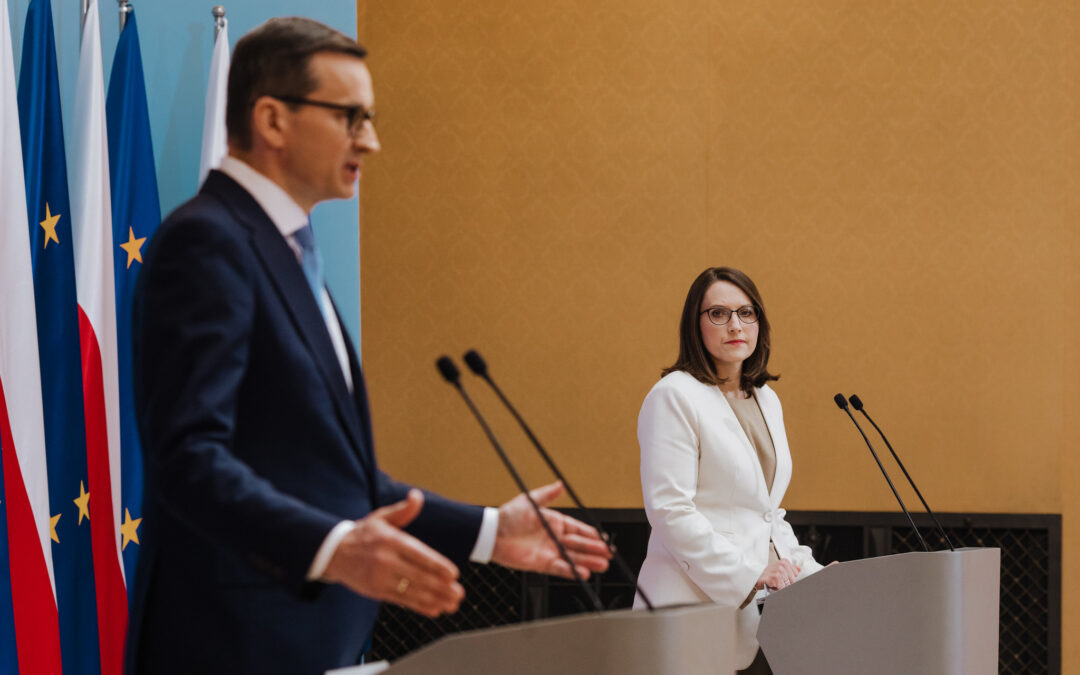Poland’s state audit office has failed to issue a positive opinion on the government’s implementation of the state budget for the first time since the fall of communism in 1989.
Every year, the Supreme Audit Office issues an assessment of the previous year’s government spending. The lower house of parliament, the Sejm, then uses that as the basis for granting the government what is known as a “discharge”.
In theory, failure to obtain such a discharge can result in the resignation of the government. However, the ruling Law and Justice (PiS) party commands a majority in the Sejm. Moreover, the Sejm’s website notes that it is not a constitutional requirement for the lack of a discharge to result in the resignation of the government.
Nigdy dotąd w III RP nie zdarzyło się, by rząd nie otrzymał od Najwyższej Izby Kontroli pozytywnej opinii z wykonania budżetu.
W tym roku rządowi @MorawieckiM to się „udało”.
Skala zadłużenia wyprowadzonego poza budżet jest ogromna.#DziuraMorawieckiegohttps://t.co/eYcJP2ckIQ— Bianka Mikołajewska (@BMikolajewska) June 15, 2023
NIK, whose president, Marian Banaś, has regularly clashed with PiS, has in previous years raised issues regarding the implementation of the budget. But until now it always issues an overall positive opinion.
But in its latest report, covering spending in 2022, the audit body wrote that it “negatively assesses the directions of changes in the system of public finances”.
It found that actions “violating basic budgetary principles, in particular transparency, unity, access to public information and annuality of the budget”, have been carried out “on an unprecedented scale”.
Poland’s deficit for 2022 came in almost 60% lower than planned in the budget, despite the effects of the pandemic and war in neighbouring Ukraine.
"We have survived the plagues of Egypt," says the prime minister https://t.co/CJl6Zlbwsn
— Notes from Poland 🇵🇱 (@notesfrompoland) March 6, 2023
“The state’s economy is carried out to a large extent outside the state budget, disregarding the rigour inherent to the budget,” wrote NIK’s Council, a body tasked with approving and enacting key documents that NIK is required to submit to parliament.
The auditor noted that, at the end of 2022, there was a record difference of 302.6 billion zloty (€67.7 billion) between the public debt calculated according to the EU’s methodology and that determined according to Polish national rules.
“In 2022, various solutions that disturbed the transparency and annuality of state budget implementation continued to be used widely, and a significant part of state tasks was financed with funds included not only outside the state budget or the Budget Act, but even outside the public finance sector,” it added.
Poland’s state auditor has found that the government used “unprecedented mechanisms” to spend more than rules on public debt allow during the pandemic.
An economist says that Poland has the second-highest level of such understated debt in the EU https://t.co/Vdf6DWuAuc
— Notes from Poland 🇵🇱 (@notesfrompoland) July 16, 2021
“[Finance] Minister [Magdalena] Rzeczkowska will go down in history as the first minister, the author of the budget, who did not receive a positive opinion from the Supreme Audit Office on the discharge of the government,” wrote Sławomir Dudek, head and chief economist of the Institute of Public Finance.
“NIK’s analysis will be key evidence in the future in holding to account the finance minister, the ministry’s leadership, which allowed the dismantling of the public finance system and sent a fictitious budget to parliament,” added Dudek.
The economist – who has in the past repeatedly pointed to the lack of transparency in the Polish budget – estimates, using information sent by Poland to Eurostat, that In its report on the budget, sent to the Sejm, the government showed only around 12% of the real deficit.
According to finance ministry, the state budget deficit in 2022 was 12.6 billion zloty (0.4% of GDP) against a planned 29.9 billion zloty. But “the real government deficit is around 101 billion zloty”, claims Dudek.
Presja zadziałała. Opublikowali uchwalę. Tutaj mój komentarz > https://t.co/A5SMfbQHo2 https://t.co/bi5Di9n1br
— Sławomir Dudek (@DudSlaw) June 15, 2023
Although Rzeczkowska has not yet responded to NIK’s or Dudek’s claims, one of her deputy ministers, Artur Soboń, asserted in an interview with news website Wirtualna Polska that the execution of last year’s budget deserves discharge.
“We used tools that were also used by other EU countries and proved to be effective,” said Soboń.
“In the 2022 budget, we applied extraordinary measures due to the turbulent circumstances,” he added, referring to the beginning of the war in Ukraine. “I believe they were appropriate. Ultimately, we will consolidate state budget expenditure and revenue.”
W #budżet2022 w związku z występującymi wówczas turbulentnymi okolicznościami stosowaliśmy nadzwyczajne środki. Uważam, że były adekwatne. Finalnie będziemy konsolidować wydatki i dochody #budżet.u państwa – wicemin. @sobonartur w @wirtualnapolska.#Tłit pic.twitter.com/AdJ8wjOc41
— Ministerstwo Finansów (@MF_GOV_PL) June 16, 2023
Main image credit: Prime Minister’s Chancellery / flickr.com (under CC BY-NC-ND 2.0)

Alicja Ptak is deputy editor-in-chief of Notes from Poland and a multimedia journalist. She has written for Clean Energy Wire and The Times, and she hosts her own podcast, The Warsaw Wire, on Poland’s economy and energy sector. She previously worked for Reuters.




















